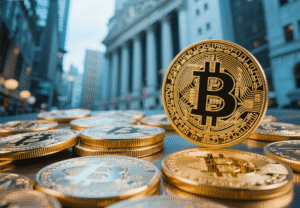Savvy traders never pay full fees. Use these referral codes to save for life: Binance WZ9KD49N / OKX 26021839

<
Community Debates and Governance Issues Within the Bitcoin Ecosystem
The Bitcoin ecosystem is renowned for its decentralized nature, which fosters innovation but also creates challenges related to decision-making and governance. At the heart of these challenges lie community debates, where differing perspectives often clash over key technical and philosophical questions.
What Drives Community Debates?
Bitcoin’s governance model is unique because it relies heavily on consensus among its participants—developers, miners, node operators, and users. This decentralized structure means that no single entity has absolute control over changes to the protocol. Instead, decisions are made collectively through a process known as “on-chain governance,” where miners validate transactions and users decide whether to adopt or reject updates by upgrading their software.
Community debates typically arise from disagreements over proposals aimed at improving scalability, enhancing security, or increasing usability. For instance, debates have erupted over block size limits, SegWit (Segregated Witness) implementation, and more recently, the Lightning Network’s role in scaling solutions. These discussions often reflect broader ideological divides between those who prioritize decentralization and others who emphasize efficiency and adoption.
Key Governance Issues
Scaling Challenges: One of the most contentious issues has been how best to scale Bitcoin without compromising its core principles. Proposals like increasing the block size limit have been met with fierce resistance due to concerns about centralizing mining power. Conversely, solutions such as SegWit aim to improve transaction throughput without altering the block size limit, yet they too face skepticism from some quarters.
Consensus Rules: Changes to Bitcoin’s consensus rules require broad agreement across the network. This makes governance particularly challenging since even minor adjustments can lead to unintended consequences. A notable example was the Bitcoin Cash hard fork in 2017, which occurred when a group of developers and miners disagreed with the SegWit upgrade and opted to create an alternative chain with larger blocks.
User Empowerment vs. Developer Influence: While Bitcoin’s architecture theoretically empowers all stakeholders, in practice, developer teams wield significant influence due to their expertise in coding and understanding of the protocol. However, this dynamic sometimes leads to accusations of undue influence or lack of transparency in decision-making processes.
Resolving Disputes Through Consensus
Despite these challenges, the Bitcoin community has historically managed to resolve disputes through compromise and collaboration. Open forums, such as Reddit, Bitcointalk, and GitHub repositories, provide platforms for ongoing dialogue and feedback. Additionally, formal mechanisms like BIPs (Bitcoin Improvement Proposals) allow developers to propose and discuss changes transparently before implementation.
Ultimately, the success of Bitcoin’s governance model depends on maintaining trust and cooperation among its diverse stakeholders. As the ecosystem continues to evolve, fostering inclusive debate and ensuring equitable participation will remain critical to addressing future governance challenges.
Bitcoin Market Dynamics
Frequently Asked Questions About Bitcoin’s Current Market Dynamics
Question 1: Why is there a shortage of Bitcoin in the market?
Answer 1: The shortage is due to institutional investors buying large amounts of Bitcoin, holding onto them, and reducing the available supply. This has led to a situation where demand exceeds supply.
Question 2: How does this affect the average Bitcoin user?
Answer 2: The reduced availability of Bitcoin can lead to higher prices and increased volatility, making it harder for regular users to acquire Bitcoin at affordable rates.
Question 3: Will mining keep up with the growing demand?
Answer 3: No, current mining output is not keeping pace with the rate at which corporations are acquiring Bitcoin, leading to concerns about long-term supply stability.
Question 4: What do experts say about the future of Bitcoin?
Answer 4: Experts believe that Bitcoin could transition from being a highly volatile asset to a more stable store of value akin to a strategic reserve, driven by institutional investment and long-term holdings.
Question 5: Is there any hope for new investors to enter the market?
Answer 5: While the market is tight, new forecasts suggest significant institutional inflows, potentially opening up opportunities for new investors as the market adjusts to these changes.




